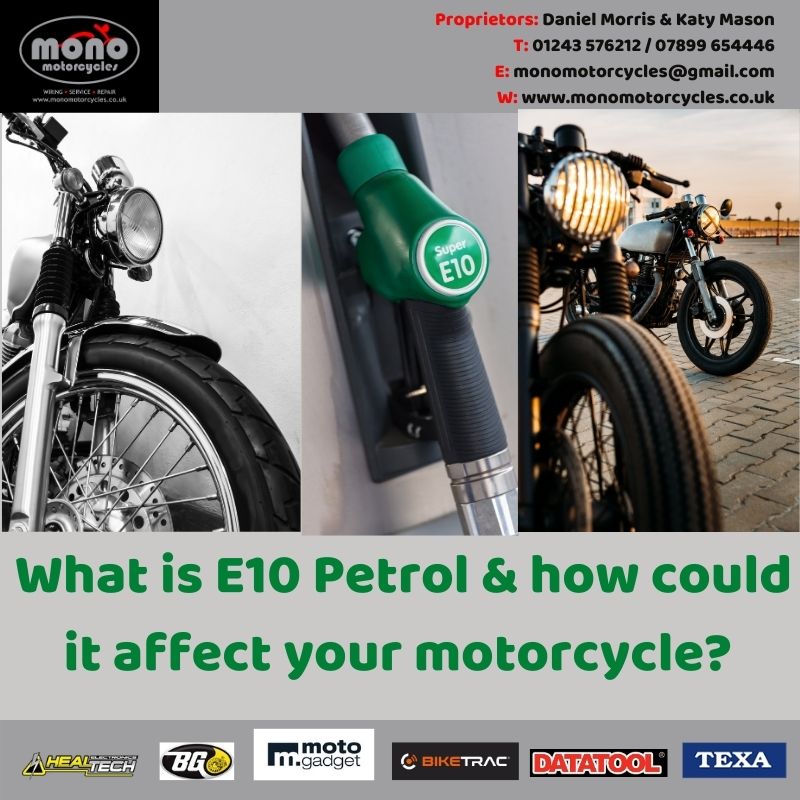How could E10 Petrol affect your motorcycle?
The UK Government has announced that as of Summer 2021 the standard (or ‘Premium’) petrol grade in the UK will become E10.
E10 petrol contains up to 10% renewable ethanol which is added to help reduce overall CO2 (carbon dioxide) emissions (not to be confused with GHG emissions) & in doing so, help the Government reach it’s emissions targets. E5, with no more than 5% will become the higher-octane option at the petrol pumps.
The UK Government states that introducing E10 onto the UK forecourts could cut transport CO2 emissions by 750,000 tonnes a year – the equivalent of taking 350,000 cars off the road. (1)
By blending ethanol with traditional fuels, less fossil fuels are used & in doing so CO2 emissions are reduced.
What is ethanol/bioethanol & how is it produced?
Fermentation is the primary production method for producing ethanol/bioethanol. The starch sources used to create bioethanol span a large spectrum of sustainable products, from corn, wheat, grain sorghum, barley, & potatoes, to sugar crops such as sugar cane & sweet sorghum.
In some countries, biomass is now being refined to create bioethanol. Products such as corn husks, stalks & leaves are now being blended in the production of bioethanol, adding further credibility to the circular economic nature of bioethanol production.
The wastage in ethanol/bioethanol is minimal as the by-products of ethanol production are often used in animal feed.
What evidence is there that ethanol based fuels reduce emissions?
“Studies have shown a direct correlation between increasing ethanol levels & reducing pollutants such as particulates, as well as suggesting that E10 could reduce NOx by up to 34%, particulate matter & nanoparticles by up to 96%, & carcinogens by around 7%.” (1)
How will using E10 affect your motorcycle?
Most motorcycles produced since the late 1990s are approved by manufacturers to use E10 & users will see little or no change in their vehicle’s performance. (2)
However, high ethanol fuel like E10 has a shorter shelf life than the higher octane E5 & can cause damage to older vehicles, particularly those built with carburettors.
Vehicles which are not used regularly for example & are left with high ethanol fuel in their tanks; may find that the fuel goes stale quickly & can cause running issues & make the vehicle difficult to start.
NB: Organic-based Ethanol can lose its combustibility in just one to three months due to oxidation & evaporation.
Furthermore, ethanol derived from biomass naturally has a higher water content & can therefore cause damage to components such as seals & diaphragms & it’s corrosive nature can cause damage to some plastics, metals & alloys.
Ethanol is also hygroscopic, which means it can absorb & mix with water, even drawing it in from the air around it. Ethanol is also a solvent which means rubber, plastic & fibreglass parts which were designed to be in contact with pure petrol, can be compromised once exposed to E10. With many bikes having plastic fuel tanks, this is naturally a concern.
A few years ago, there were issues in America – where E10 has been in use much longer, with motorcycles including Ducati Monsters, Sport Classics & Multistradas suffering distorted plastic fuel tanks as they reacted to ethanol in the fuel. (3)
How can you prevent damage from ethanol if your motorcycle is going to be stored & or stood for any length of time?
Using a good quality fuel stabiliser can prevent evaporation & assist with reducing the damage caused by the ethanol & higher water content of an ethanol based fuel.
What happens if your vehicle is not compatible & you happen to fill up your tank with E10, when your vehicle should only run on E5?
The Government assures that if it is a one time occurrence, you would not need to drain your tank, but just ensure you fill up with E5 the next time. However, the guidance is clear, if you do fill up your tank with E10 repeatedly in a non-compatible vehicle, this may cause damage to the engine.
- https://www.fleetnews.co.uk/news/environment/2018/07/25/government-consultation-on-bioethanol-criticised
- https://www.gov.uk/guidance/e10-petrol-explained
- https://www.bennetts.co.uk/bikesocial/news-and-views/news/2020/march/what-is-e10-fuel-and-is-it-safe
